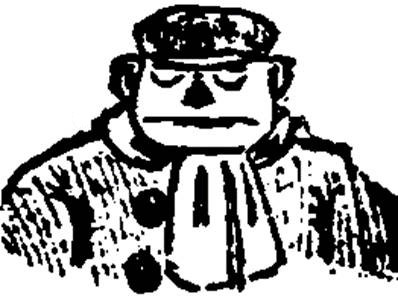This article has been transcribed from a copy of the Cardiff Times in the online collection of scanned Welsh newspapers 1804-1919 in the National Library of Wales, with grateful recognition of the free access accorded to all readers. A decorative initial has been added, and where necessary paragraph breaks have been introduced for easier reading.
This is one of four articles presenting skating. The National Skating Association, the first national association for the sport, had been set up in Cambridgeshire and Huntingdonshire in 1879, based on many years of competition between members of the University and workers in the Fens, where, as in the Low Countries, skating was a necessary skill. The regional linguistic usage in this article belongs neither to East Anglia nor Wales, but to Yorkshire. The three other articles on skating are: 4 December 1886, 7th January 1888 and 21 December 1889. The preceding article in the same page of the Cardiff Times describes the far more proficient skating in New York, illustrated by the image of ‘A Long Dashing Down-an-Incline Slide’ involving numerous skaters. — David Skilton

'Oh, My Prophetic Soul, My Ankle.'

he first thing, sir, I have [***] about skating is that immediately one has got everything prepared for [**] a day’s [**] it is sure to thaw, but that if the frost happens to hold firmly, well, one is always prevented either by business, or some circumstance or another of an untoward nature, from enjoying the sport. Most pastimes, sir, that have any attractiveness in them are full of disappointments. They are like the game of life, full of conflicting chances. I may say at once that skating is more full of ‘ups and downs’ - especially downs --than most pastimes. It is full of ‘ins and outs’ too; the ‘ins’ are very unpleasant indeed, even if the water isn't particularly deep, and unpleasant, too, are the ‘outs’ when the Humane Society's drag happens to catch a portion of one's person instead of one's garments simply. One thing which always surprises me, sir, about skating is the number of people who seem to have leisure to pursue the art during the working hours of the day. I have noticed the fact even this year, and gather from it either that there are just now a good many young men in the employment of the phantom firm known as ‘Streets and Walker,’ or that we have a host of gentlemen amongst us who can afford to live on their means. But to return to the disappointments of skating. Have you ever tramped several miles, sir, in order to reach a likely pond, and then found to your utter chagrin and dismay, after making one or two of the preliminary runs that one of the screws had broken off short from the skate and still remained in your heel? Have you ever endured the wild, mad misery of finding that the blade of one of your skates is hopelessly loose, and that nothing but a professional hand can repair it? Have you awakened to the knowledge that the most necessary strap pertaining to your ‘blades’ has been left at home? And have you tramped hopelessly, enviously, bitterly back, muttering maledictions upon all the world, and upon skaters with efficient implements in particular? Painful it is to me, sir, to ask such questions, for they may bring back melancholy memories. I have had much experience of skating, sir, and I think I can give your readers a few skates [troublesome persons]. They usually have in their possession giant gimlets, which more suggest mighty augers than anything else, and these they use with such a redundancy of energy, whilst you are talking to a friend, that they bore a hole almost up to your ankle bone, and you are left howling around with the Brobdignagian gimlet still stuck in your heel, whilst an interesting crowd of starved-nosed looking boys cheer you ironically from the bank. In regard to your own gimlet, too, see that you never lend it to anyone on the pond, and I do most earnestly conjure all your readers to most religiously protect the sharp end of the said instrument with a piece of cork, for sitting down unexpectedly on a gimlet affords anything but pleasurable sensations.

Let none of your readers ever try to be what is called in these parts [Yorkshire] a ‘nap’ or ‘clever-headed’ skatist, for such always come to grief. refer to the young men, sir, who arrive at the pond fully got up for the occasion — the young men who sport a good deal of spurious fur, high top boots, and most elaborate hints [sic]. If they can decently help it, let me advise them never to offer to put on any lady's skates, no matter how fair she may be. If they do, they will pay dearly for their gallantry; in fact, their trousers' knees will be horribly wet with kneeling, their hands will be dirty and frozen, it is more than probable that the lady, not fully understanding the difficulties of the position, will think them blunderers; and the chances are that they may pull the lady's boot heel off or break their gimlet short off in the heel, or, in their efforts to adjust the skates properly, may push the camp stool on which she is sitting clean over. Of course the said lady, if she is not able to skate, will, about every two minutes, be saying that she is sure that the skates are not quite fast, or that they are too fast, or that she is certain she has injured her ankle. Then again, sir, let no guiltless reader of this journal listen to the seductive accents of the touts who hang around the pond offering to put on your skates. Once equipped for the sport, these young gentlemen commence a series of wild gyrations, evidently imagining, throughout their proceedings, that they are striking all the other persons present dumb with admiration.

If the crowd be great, each one of them selects a small rink of his own, in which he cuts impossible figures greatly to his own satisfaction; and if you happen to intrude on him, woe betide you. But the ‘nap’ [‘clever-headed’] skater always comes to grief, either on that portion of the pond marked ‘dangerous,’ or, whilst skating backwards way, by coming into collision with a small boy, who imagines that he is skating because he has got a bit of iron fastened to one boot sole, and who pushes himself along by kicking spasmodically with the other leg. Or the ‘nap’ skater has a horribly agonising bump with a hopelessly unpromising learner, who was spread eagle-ing [sic] himself and throwing his apparently boneless limbs all over the pond. In the case of immersion the aforesaid ‘clever-headed skater’ cuts a terribly ignominious figure when he is lugged out; the damsels who, as he imagined, fancied his style, titter, and the men who have got him out say gruffly, ‘Sarves yer right for going where yer did.’ To such sympathetic souls as inquire how he feels, he replies, as well as his chattering teeth will allow him: ‘All ri-i-ight; thank you,’ and he gives a green and sickly smile. Some fellow in the crowd offers to cut his skates off for him; the offer is accepted, but, somehow, neither the man who cuts them off nor the skates are ever seen again. And the ‘nap’ skater proceeds homewards in a state of unutterable misery, with a sort of concert (consisting of the rattling of his teeth and the oozing of the water in his boots) proceeding in relation to his own proper person.

A most unfortunate individual on the ice, sir, is the good-natured fat man, who, whilst being able to hobble along a little, gets into everybody’s way. Often, indeed, is it that the maniacal skater generally an eccentric looking man, with goggle eyed glasses, who rushes madly round and round the pond with his gaze intently rivetted on the toe-piece of his skates) comes into fearful contact with him, and the consequence is that the urge-on-my[-]mad[-]career skatist is picked up in a most dismal state of wreck, and with his face nicely scraped from the forehead to the chin end. As for the big, good-natured man, falls do not seem to sensibly affect him, for, after each, he picks himself up, takes a huge dram from an apparently inexhaustible flask, and shuffles off. The playful urchins who insist on sliding, and ‘keepin’ the pot a-boilin’ on the very best bit of ice on the pond, are certain to have trouble with the fat man. The one in the picture, for instance — the young gentleman who, having picked up a cigar stum[p?], is enjoying the same immensely, and conversing with a friend who is doing the ‘polka’ sliding trick at a few yards' distance. On comes the lumbering good-[a] natured man trying to make headway backwards. Bang down he comes, with all his eighteen stone of weight, upon the lover of the weed, who is, after a minute or two, extricated, a flat, limp, and breathless mass. He is flattened out even to his cigar stump and buttons, and it is difficult to say, at the time, whether be will ever regain anything like rotundity.

'Much Flattened, I'm Sure.'
I have not space herein to describe the complicated series of falls to which the average skater subjects himself, else would I go into the peculiar effect produced on one's equilibrium by getting a blade of one's skate in a crack; by falling across a heap of snow; by being unable to stop one's self, and in consequence, rushing wildly into the bank of the pond. All these are pleasurable sensations, my dear sir. Let me conclude, sir, by saying that if you have ever the opportunity of seeing a genuine ‘sparring’ match on the ice, don't neglect it. One skater has, we will say, insulted another; they box round each other, and the effect produced is precisely analogous to what might be imagined to occur were two ‘knockabout’ men on the theatrical boards to genuinely fall out and endeavour in all seriousness to show what they could do.
Last modified 21 October 2021